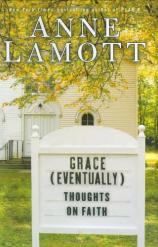Grace (Eventually): Thoughts on Faith
Review
Grace (Eventually): Thoughts on Faith
"There is not much truth being told in the world. There never was. This has proven to be a major disappointment to some of us." So begins Anne Lamott's GRACE (EVENTUALLY), her newest collection of truth-telling --- essays on faith, relationships, forgiveness, politics, aging and a smattering of other delightfully diverse topics. Readers will be happy to find here the same blunt brand of no-holds-barred writing that has made Lamott's voice distinctive in the literary world.
As in PLAN B and TRAVELING MERCIES, some of the essays take a confessional turn. It's been two decades since Lamott quit hitting the bottle, and junk food binging has become her drug of choice. "I don't smoke or drink anymore, am too worried to gamble, too guilty to shoplift, and I have always hated clothes-shopping. So what choices did that leave?" Her narration of a furtive trip to the grocery store to buy three apple fritters, a pint of Ben & Jerry's New York Super Fudge Chunk ice cream, jalapeno "poppers," Mint Milano cookies and Sara Lee chocolate dipped cheesecake bits is as guilty as any drug addict's recounting of a last fix.
"I prayed impatiently for patience, and to stop feeling disgusted by myself, and to believe for a few moments that God, just a bit busy with other suffering in the world, actually cared about one menopausal white woman on a binge." Out of it comes an important truth about her need for community, as well as the root of her binging: "I did discover an important clue --- that whenever I want to either binge or diet, it means that there is some part of me that is deeply afraid…all I could think to do was what every addict thinks of doing: kill the pain."
Despite her trademark candidness, Lamott has mellowed in some ways. "I don't hate anyone right now, not even George W. Bush. This may seem an impossibility, but it is true, and indicates the presence of grace, or dementia, or both." Although her politics are not as angry as in PLAN B, this mellowing doesn't keep her from tackling some hot-button issues. Lamott is forthright about her pro-choice views, which she details in "The Born": "…as a Christian and a feminist, the most important message I can carry and fight for is the sacredness of each human life, and reproductive rights for all women are a crucial part of that." In another essay, "At Death's Window," she narrates her role in helping a terminally-ill friend die. This is particularly difficult though poignant territory --- like rubbernecking at a traffic accident --- and likely to generate the most discomfort among readers.
Agree? Disagree? No matter how you feel about Lamott's choices, it's easy to identify with her messy spirituality, struggles with parenting a teenager, or frustration over the aging process. Anyone who has ever corralled a group of kids for Sunday School will find "Wailing Wall" required reading. Lamott frankly admits that she'd rather be with the adults. ("I needed the grown-up service so badly, the singing, the prayers, the silence, and especially the very low incidence of injury.") Yet what comes through in this particularly powerful essay is encouragement and a reminder that some things aren't all about us. "How much of the lesson did the children take in that day? I can't answer that, and besides, I wasn't in charge. But it all comes to dropping a few seeds on the ground. If the soil is ready, the seeds will grow, and if not, you could have the Archangel Michael buzzing around the room in a thong and the kids still won't get it."
Besides her pithy, don't-pussyfoot-around-the-ugly-stuff approach to Christianity, what sets Lamott apart as a writer is her fresh use of language. Lamott knows how to jury-rig together odd phrases and descriptions that click with the reader in "aha!" moments. In one passage, she writes about a spiritual awakening: "Molecules shifted, as if in the shimmer before a migraine…I felt as though I was snorkeling one concentric circle outside where I had been before." In another, on writing: "I've found that when you give up on using your mind to solve a problem --- which your mind is holding on to like a dog with a chew toy --- writing it down helps turn off the terrible alertness."
Obviously, here, as in all of her collections of essays, Lamott uses writing to make sense of herself and her world. Because of her honesty and plain talk, we are challenged to engage with our faith --- or lack of it --- and decide how we can be true to it and to ourselves. And as all of Lamott's books so beautifully evince, the journey of faith is going to be full of potholes. Fortunately, she also reminds us that Someone bigger than ourselves is there to pull us out when we get stuck.
Reviewed by Cindy Crosby on March 20, 2007
Grace (Eventually): Thoughts on Faith
- Publication Date: March 20, 2007
- Genres: Essays
- Hardcover: 272 pages
- Publisher: Riverhead
- ISBN-10: 1594489424
- ISBN-13: 9781594489426





